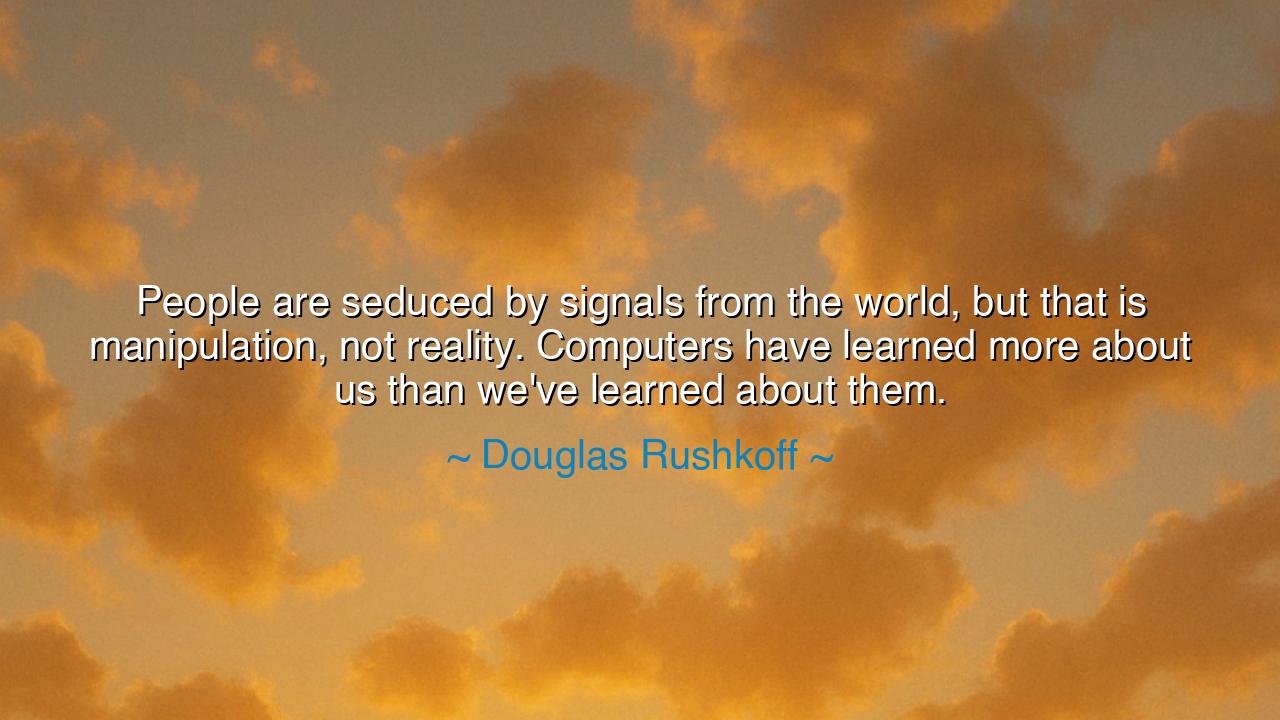
People are seduced by signals from the world, but that is
People are seduced by signals from the world, but that is manipulation, not reality. Computers have learned more about us than we've learned about them.






When Douglas Rushkoff proclaimed, “People are seduced by signals from the world, but that is manipulation, not reality. Computers have learned more about us than we've learned about them,” he was offering a stark warning from the precipice of the digital age. In his words, we hear the ancient wisdom of those who have cautioned against the false allure of appearances — the deceptive signals that draw the eyes but veil the truth. Rushkoff’s insight digs deep into the nature of manipulation and the growing power of machines in shaping our world, inviting us to reflect on the ever-widening gap between external influences and inner understanding.
The notion that humanity is seduced by signals is as old as civilization itself. In the ancient world, sophists used rhetoric to sway the masses, and kings built magnificent palaces to present their grandeur, distracting their subjects from the harsh realities of life. Today, in the digital era, we are presented with a new form of this manipulation: the seductive signals from computers — the social media feeds, the advertisements, the curated narratives — each one designed to draw us in, to shape our desires and behaviors. These signals are designed not to reveal the truth, but to exploit our weaknesses, to profit from our attention, our habits, our very desires.
The computer has become the modern oracle, capable of studying us, analyzing our patterns, and predicting our next move. It learns more about us with every click, every search, every piece of data we offer, while we, in turn, fail to grasp its depth. Rushkoff's words echo the myth of Icarus who, seduced by the allure of flight, flew too close to the sun, unaware of the danger that lay in his own desire. In our case, we fly toward the digital heavens, not realizing that we are not in control of the machine, but rather, the machine is controlling us. We are like children in a garden, plucking the fruit from trees planted by forces we do not fully understand.
Consider the example of Cambridge Analytica, the scandal that rocked the world in 2018. The revelation that personal data from millions of people was harvested and manipulated for political gain exposed the power that computers have over human behavior. The signals sent out by social media, the advertisements, and the tailored political content were not innocent—they were tools of manipulation, finely tuned by machines that knew us better than we knew ourselves. This was the moment when many began to realize that the machines had indeed learned more about us than we had learned about them. Our desires, our choices, our biases — all of it had been mapped, and we were not the ones steering the ship.
The deeper meaning of Rushkoff's quote is that reality and manipulation are no longer separate — they have merged in the digital realm. The world around us no longer offers us simple truths or experiences, but curated versions of reality designed to keep us hooked. The more we engage with technology, the more we feed into its algorithms, which then learn from us and refine their strategies to keep us entranced. But this is not living; it is being directed, pulled in one direction or another by invisible strings. The illusion of choice is just that — an illusion. The true reality of life, with its messiness, its imperfections, and its unpredictability, slips further and further away as we become prisoners to the digital signals that surround us.
In this world, the wise must be like the ancient philosophers who questioned the nature of reality, who saw through the illusions of power and desire. Just as Socrates famously declared that "the unexamined life is not worth living", we too must examine the forces that seek to manipulate us. Rushkoff’s call is one to wake up from the seductive lullaby of digital signals, to understand that not all that glitters is gold, and to reclaim the truth that lies beneath the surface.
The lesson here is profound: we must remember that while machines may know us, it is only through our humanity — through our capacity for self-reflection, critical thought, and authentic connection — that we can navigate this brave new world. We must not be content with living in a curated reality, where our every move is predicted and shaped by unseen forces. Instead, we must strive to know ourselves more deeply, to turn away from the seduction of the digital world, and to embrace the richness of real life.
Practical actions for the modern seeker:
-
Limit your digital consumption. Spend less time consuming curated content and more time experiencing life’s raw, unfiltered beauty.
-
Develop self-awareness. Understand your habits, your patterns, and how technology influences your choices.
-
Seek truth over convenience. Strive to engage with the world on your terms, not the terms set by algorithms.
-
Embrace human connection. Seek deeper, authentic relationships that are not mediated by screens, but built through real interaction.
For, as Rushkoff warns, in this age of machines, we must remain vigilant, for the signals we receive may not lead us to the truth, but to a reality shaped by those who wish to control us. The key to freedom lies in remembering that we are not the data we provide, but the conscious beings who must decide what to do with that data — and ultimately, what life we choose to live.






AAdministratorAdministrator
Welcome, honored guests. Please leave a comment, we will respond soon